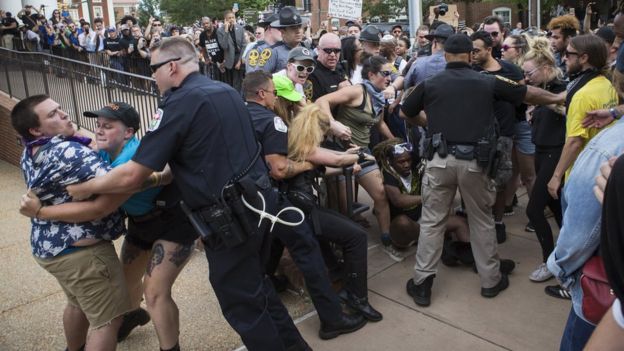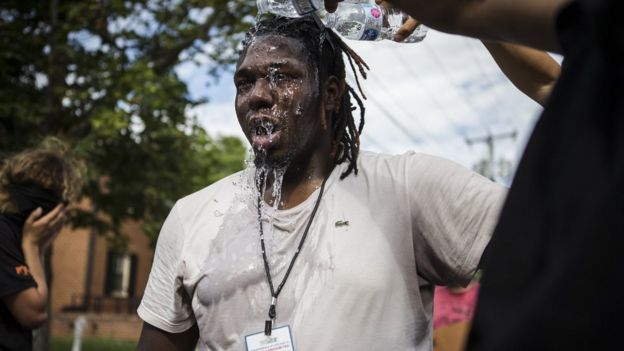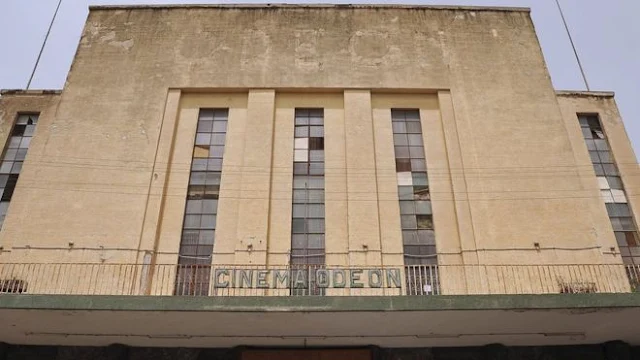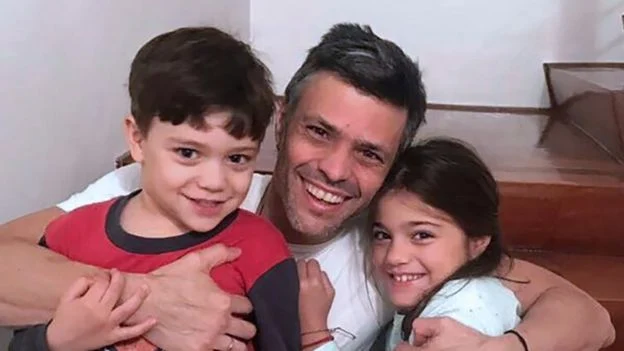Venezuela: Maduro praises opposition leader Lopez's prison release
Venezuelan President Nicolás Maduro has praised the decision to release from prison one of the country's main opposition leaders, Leopoldo Lopez.
Mr Lopez has been moved to house arrest after more than three years in jail.
He left a prison near Caracas and was reunited with his family on Saturday.
Mr Lopez was serving a 14-year sentence for inciting violence during anti-government protests in 2014, a charge he has always denied. The Supreme Court said he was released on health grounds.
Mr Maduro said he "respected" and "supported" the Supreme Court's decision but called for "a message of peace and rectification" in the country.
Hours after being freed, Mr Lopez urged supporters to continue protesting in the streets against Mr Maduro.
Venezuela's opposition and international powers have long pressed for his freedom. The head of the Organisation of American States regional bloc, Luis Almagro, said the court's decision offered an opportunity for national reconciliation.
Henrique Capriles, a former opposition presidential candidate, stressed "he must be given his full liberty together with all political prisoners", Reuters reported.
Giving a glimpse of his son's life behind bars, Mr Lopez's father told Spanish radio "a few days ago they had punished him with solitary confinement without light or water for three days".
He said his son was now wearing an electronic tag so that the authorities could keep abreast of his movements.
His wife had complained that she had not been allowed to see him for more than a month, but on Friday she tweeted she had been allowed an hour-long meeting.
In May, a government lawmaker published a video of Lopez in his cell following rumours that he had been poisoned and taken to hospital.
In the video, Mr Lopez - a Harvard-educated former mayor who has been prevented by the government from standing for public office - said he was well and did not know why he was being asked to prove he was still alive.
Venezuela has been experiencing a wave of anti-government protests similar to those over which Mr Lopez was jailed.
The opposition is calling for early elections and the release of opposition politicians jailed in recent years, saying the socialist governments of President Maduro and his predecessor, the late Hugo Chavez, have mismanaged the economy since coming to power in 1999.
- The country is in a deep economic crisis, made worse by the falling price of oil, which accounts for about 95% of its export revenues and was used to finance some of the government's generous social programmes. Forced to make cuts, Mr Maduro has seen his support fall among core backers
- Also, as a result of the crisis, parts of Venezuela face severe shortages of basic supplies such as medicine and food
- The opposition accuses Mr Maduro of not only mismanaging the economy but also eroding the country's democratic institutions
- In March, the Supreme Court decided it would take over the National Assembly. The decision was reversed, but Mr Maduro was accused by opponents of trying to stage a coup. That sparked almost daily protests calling for his resignation
- Meanwhile, Mr Maduro says the opposition is trying to overthrow his government illegally, and blames the country's problems on an "economic war" being waged against him
- BBC NEWS
Syria ceasefire: US and Russia-backed deal in effect
A ceasefire brokered by the US and Russia has come into force in south-western Syria.
It was announced after Presidents Donald Trump and Vladimir Putin met for the first time at G20 talks on Friday. The truce is also backed by Jordan.
It is in force along a line agreed by Syrian government forces and rebels.
About 300,000 people have been killed in Syria's conflict, which began with protests in 2011. Another 11 million have been forced from their homes.
- Trump and Putin hail first meeting
- Six decisive points that changed Syria's war
- Donald and Vladimir: How do they compare?
Russia and the US have backed opposing sides, with Moscow supporting the Damascus government while Washington has called for the removal of Syrian President Bashar al-Assad.
Russian forces and a US-led coalition have been carrying out air strikes in their respective campaigns.
The ceasefire, which Russia has said covers the regions of Deraa, Quneitra and Sweida, was reported to result from months of undisclosed talks between Russian and US officials.
Speaking after the meeting between Mr Putin and Mr Trump in the German city of Hamburg, US Secretary of State Rex Tillerson said: "This is our first indication of the US and Russia being able to work together in Syria."
Mr Tillerson said Friday's meeting also showed that the two countries eventual aims for Syria were "exactly the same" - but they differed on how they should be achieved.
BBC NEWS
Turkey protest: Istanbul rally concludes anti-Erdogan march
Tens of thousands of people are due to rally in the Turkish city of Istanbul at the end of a 450km (280-mile) protest march against the government of President Recep Tayyip Erdogan.
Huge crowds have joined the "justice" march since it began in the capital Ankara on 15 June.
They are demonstrating against the mass dismissals and imprisonments that followed last year's failed coup.
President Erdogan has accused the marchers of supporting terrorism.
He said the Republican People's Party (CHP) - which has organised the march - had gone beyond political opposition and was "acting with terrorist organisations and the forces inciting them against our country".
CHP leader Kemal Kilicdaroglu launched the march after one of his MPs, Enis Berberoglu, was arrested for allegedly leaking documents purporting to show that the government was arming jihadists in Syria.
Mr Berberoglu denies the charge. Sunday's rally is taking place outside the jail in which he is being held.
More than 50,000 people have been arrested and 140,000 dismissed or suspended since last year's attempted military takeover.
The detentions of human rights activists and leading journalists have drawn international condemnation.
Mr Kilicdaroglu, who began the march and has walked around 20km a day, says the purges and emergency rule by Mr Erdogan constitute a "second coup".
The failed coup last July saw rogue soldiers bombing government buildings and driving tanks into civilians, killing more than 260.
The BBC's Mark Lowen in Istanbul says the march has become an unprecedented show of defiance against the President Erdogan.
There is a widespread feeling that the government has seized the chance to crush all opponents, not just alleged coup supporters, our correspondent adds.
BBC NEWS
Liu Xiaobo: Western doctors contradict China on Nobel laureate's cancer
Two Western doctors have contradicted Chinese medical experts over the fate of a dying Nobel Peace Prize winner.
Liu Xiaobo, an imprisoned pro-democracy advocate, was moved to hospital while serving an 11-year jail term, because of his advanced terminal liver cancer.
His doctors in China say he is too ill to travel abroad for treatment, and must remain in China.
But medics from the US and Germany who examined Mr Liu disagree, and say he could go abroad for palliative care.
Joseph Herman from the University of Texas' cancer centre and Markus Büchler of the University of Heidelberg surgery department, released a joint statement saying a medical evacuation would have to happen "as quickly as possible".
"While a degree of risk always exists in the movement of any patient, both physicians believe Mr. Liu can be safely transported with appropriate medical evacuation care and support," they said.
Liu Xiaobo and his family have both asked that he be allowed to leave.
Mr Liu was a key leader in the famous Tiananmen Square protests in 1989, and has been a vocal advocate for full democracy in China since.
The state considers him a criminal dissident, and in 2009, sentenced him to 11 years in prison for subversive behaviour after he drafted a manifesto on democracy and human rights.
He was awarded the Nobel peace prize in 2010 for his "long and non-violent struggle".
"Through the severe punishment meted out to him, Liu has become the foremost symbol of this wide-ranging struggle for human rights in China," the Nobel Committee wrote.
He had more than three years remaining on his sentence when authorities moved him into a hospital.
Following his Nobel prize, Mr Liu's wife, a poet, was placed under house arrest, and has had her movements restricted ever since. She has never been charged with a crime.

Full Story: The love that survived a Chinese labour camp
By Celia Hatton, BBC News
"I found all the beauty in the world in this one woman."
Their wedding banquet was in the labour camp's cafeteria, a scenario that would prove to be symbolic. Throughout their intense romance, the Chinese government was a relentless and interfering third wheel, the uninvited partner providing a constant backdrop to their interactions.
By all accounts, Liu Xiaobo and Liu Xia were inseparable, except when they were forcibly separated.
- Read their full story here
- BBC NEWS
Mosul: Iraq PM to celebrate victory over IS in the city
Iraqi PM Haider al-Abadi has arrived in Mosul to congratulate Iraqi forces for their victory over IS in the city.
Mr Abadi was in the city to announce its "liberation" and declare "victory", his office said in a statement.
Iraqi forces, backed by US-led air strikes, have been battling to retake Mosul since 17 October last year.
Islamic State militants seized it in June 2014 before taking much of Iraq's Sunni Arab heartland and proclaiming a "caliphate" straddling Iraq and Syria.
Kurdish Peshmerga fighters, Sunni Arab tribesmen and Shia militiamen have also been involved in the battle.
The Iraqi prime minister arrived to "congratulate the armed forces and the Iraqi people" on the final defeat on Sunday, the statement said.
BBC NEWS
KKK rally in Virginia leads to rival protests and clashes
A march by supporters of the white supremacist Ku Klux Klan (KKK) group in the US state of Virginia has been met by hundreds of rival demonstrators.
Dozens of KKK members took part in an authorised march to protest at the planned removal of a statue of General Robert E Lee from Charlottesville.
General Lee oversaw the pro-slavery Confederate forces in the US civil war.
The marchers, some carrying Confederate flags, were separated from rival groups by metal barricades and armed police.
The KKK supporters were escorted to and from the rally on Saturday by police.
They were greeted in the university town by large crowds chanting "shame" and "racists go home" shortly after they had gathered at Justice Park.
"Police were deployed to secure access to the park and ensure the safety of all involved," a Virginia State Police spokeswoman said.
Police declared the counter-protests "unlawful" and used tear gas to disperse the crowds. Several people were arrested, local media report.
 Image copyrightGETTY IMAGES
Image copyrightGETTY IMAGES Image copyrightGETTY IMAGES
Image copyrightGETTY IMAGES
Defending the Confederate flag and monuments that recall the era of slavery have become a rallying cause for both old and new branches of the far right in the US.
Some observers argue that US President Donald Trump's election to the White House has re-energised the far right movement across the United States.
In May, a torch-lit rally against the removal of Confederate monuments in Virginia was condemned by a local mayor. More than 100 people attended a counter-protest the following night.
A rally in February 2016 ended with the arrests of 13 people after a violent brawl between members of the KKK and rival demonstrators resulted in a number of stabbings in Anaheim, California.
BBC NEWS
Subscribe to:
Comments (Atom)
Apple to scan iPhones for child sex abuse images
Apple has announced details of a system to find child sexual abuse material (CSAM) on customers' devices. Before an image is stored on...




















